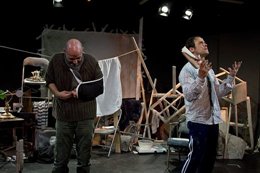It’s always encouraging to see new writing on the Irish stage, and it's always slightly disheartening when a new script hasn’t received careful consideration in terms of its development. Arnold Thomas Fanning’s Griswold could have been a cracker of play that pointedly tackled issues of identity, existential anxiety and the interconnected nature of both historical and personal violence - but a muddled, repetitious dramaturgy ultimately robs the piece of momentum and impact. Even though it exhibits moments of inspiration, Griswold comes across as a tangle of disparate themes and odd tangents that is ultimately undone by a lack of focus in its articulation of plot, both textually and directorially.
Tadhg (Shane Gately) and Henry (Thomas Farrell) are two undocumented Irish men living in a dilapidated flat in New York’s Chinatown during the months following the 2001 terrorist attacks on the World Trade Center. Sonia Haccius’ set effectively evokes Tadhg and Henry’s claustrophobic loft apartment, subtly suggesting the jumbled debris field at Ground Zero in the broken tables, chairs and other detritus that pen in the men’s living quarters. Colm Maher’s lighting also offers a striking opening image, as a silhouette of the pre-9/11 skyline is projected onto the back wall, generated cleverly from the seemingly random placement of loose pieces of lumber and metal.
 The lack of material comforts is clearly an immediate problem, as both men have since lost their jobs as window washers at the Twin Towers, and are now scrounging to make any kind of living. Tadhg roams the streets during the day, finding sporadic work with a moving business run by an “Irish prick”. Henry spends his days typing up some sort of magnum opus and cultivating an acute agoraphobia, refusing to step outside for fear of being the victim of another attack. A sense of latent homoerotic interdependence is shared between the two men, and is played up at times to disturbingly comic effect, with Henry, gifted with “magic hands”, giving Tadgh a sensuous massage using spare corn oil. Indeed, much of Henry and Tadgh’s twisted, hermetic relationship recalls to some degree the enclosed worlds of Philip Ridley or Enda Walsh, where elliptical language and grotesque role-playing readily warp reality. When Tadgh is involved in the apparently accidental death of a dog in his care, he tries to con Henry into using his magic hands to help pay the dog’s unscrupulous off-stage owner, the enigmatic Mr. G, for the loss.
The lack of material comforts is clearly an immediate problem, as both men have since lost their jobs as window washers at the Twin Towers, and are now scrounging to make any kind of living. Tadhg roams the streets during the day, finding sporadic work with a moving business run by an “Irish prick”. Henry spends his days typing up some sort of magnum opus and cultivating an acute agoraphobia, refusing to step outside for fear of being the victim of another attack. A sense of latent homoerotic interdependence is shared between the two men, and is played up at times to disturbingly comic effect, with Henry, gifted with “magic hands”, giving Tadgh a sensuous massage using spare corn oil. Indeed, much of Henry and Tadgh’s twisted, hermetic relationship recalls to some degree the enclosed worlds of Philip Ridley or Enda Walsh, where elliptical language and grotesque role-playing readily warp reality. When Tadgh is involved in the apparently accidental death of a dog in his care, he tries to con Henry into using his magic hands to help pay the dog’s unscrupulous off-stage owner, the enigmatic Mr. G, for the loss.
The potential for a dark, tightly plotted farce is dampened considerably by Fanning’s repetitive dialogue that, while making nods to Pinter and Beckett, fails to generate the same undercurrent of menace. In fact, on several occasions both Farrell and Gately appear unsure of the order of their lines, at times jumping each other’s cues or offering half-hearted deliveries, further dulling the effect of Fanning’s telegraphic language. Farrell especially seems uncomfortable in the role of Henry, playing a sort of generalized notion of neurosis that lacks dynamism. Gately’s performance as the bullying Tadgh, while more assured, is missing real nuance or depth, as both actors appear to struggle with the absence of defined trajectories for their characters within the play’s action.
It’s not until after the interval, when Tadgh attempts to conscript Henry and his talent for massage that any sense of genuine conflict and momentum is achieved, and it is at this point that the play that could have been makes a brief appearance. But this moment comes and goes, and after an hour and a half of vague plot twists and turns it appears that not enough time or attention was paid to developing the script before launching into rehearsals. Devlin’s direction doesn’t help the situation, and for the most part the actors are left high and dry, wandering about the stage with unmotivated crosses and unearned moments of breaking the fourth wall.
With stronger direction and more dramaturgical intervention, this could have been a compelling piece of theatre, but as it stands an opportunity has been missed to give a writer a genuine shot at seeing his work fully realized.
Jesse Weaver completed his doctoral thesis at University College Cork in 2011. His research focus was on the changing roles of the playwright in Irish theatre production from 1980 to 2010.